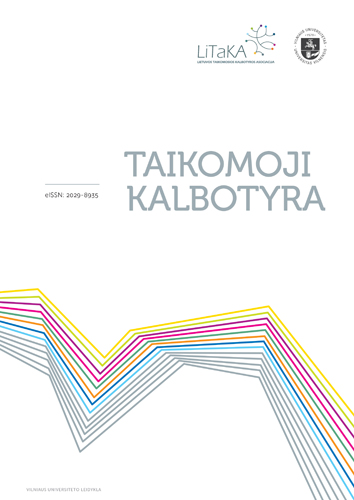Sources of one-word terms used in UK and Lithuanian constitutional law acts
Sources of one-word terms used in UK and Lithuanian constitutional law acts
Author(s): Liudmila Mockienė, Sigita RackevičienėSubject(s): Law, Constitution, Jurisprudence, Descriptive linguistics
Published by: Vilniaus Universiteto Leidykla
Keywords: legal terminology; constitutional law; one-word terms; sources of terminology; formation of terminology; contrastive analysis;
Summary/Abstract: The article addresses the issues of formation of legal terminology in Lithuanian and English. The terminology of Lithuanian law started to be formed at the beginning of the 20th century. Its development has been influenced by several political upheavals and has undergone considerable changes. Since new legal terms are constantly created, it is worthwhile to compare and contrast the Lithuanian term formation tendencies with the term formation traditions in other languages. Contrastive research not only reveals peculiarities of term formation in different languages, but allows researchers to see the native terminology in a new light and assessing it more objectively. In this article, the Lithuanian constitutional law terms are compared with English constitutional law terminology that has a long history dating back to the 13th century. The terms were collected from the major UK legal acts of constitutional nature translated into Modern English, namely Magna Carta (1297), Habeas Corpus Act (1679), the Bill of Rights (1689) and the Act of Settlement (1700), including the amendments as in force today, and the original text of the Human Rights Act (1998) and the Constitution of the Republic of Lithuania (1992). The results of the research lead to the following conclusions:1) The majority of one-word terms of constitutional law in English come from external sources. In Lithuanian, on the contrary, terms formed on internal sources prevail over the external sources.2) Terms formed on the basis of internal sources in English include a similar number of simple terms and formations (derivatives and compounds). In contrast, terms that come from internal sources in Lithuania are mainly formations made by means of affixation, inflexion, compounding and conversion. 3) The main source of borrowings of one-word terms of constitutional law in English is Italic languages, such as Latin and French. Terms of other origin, e.g. Greek, Old Norse, Middle Dutch, constitute a relatively small part of borrowed terms in English. In Lithuanian the majority of international terms are also of Italic (Latin) origin. Other minor sources include Greek and Polish. 4) Both languages have a small number of hybrids, terms formed by means of combining internal and external sources (mostly French and Latin).The authors expect that the findings of the research will provide useful information to the developers of the Lithuanian legal terminology, as well as to the users of the Lithuanian and English legal terms.
Journal: Taikomoji kalbotyra
- Issue Year: 2015
- Issue No: 7
- Page Range: 1-20
- Page Count: 20
- Language: English

